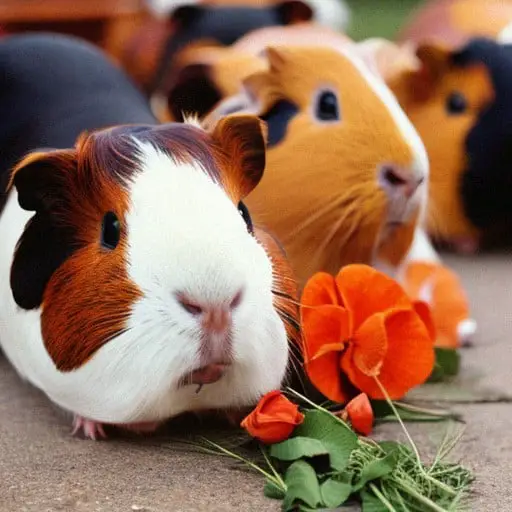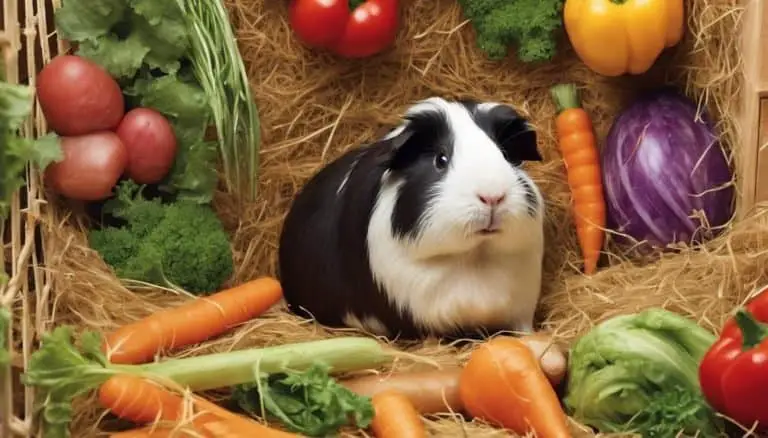Can Guinea Pigs Eat Apples? A Comprehensive Guide to Feeding Your Furry Friend
As pet owners, we want to ensure that our furry friends are getting the best nutrition possible. Guinea pigs are no exception, and as herbivores, they require a diet rich in fiber and vitamin C. While hay and fresh vegetables are staples in their diet, you may be wondering if guinea pigs can eat apples. In this article, we will explore the nutritional benefits of apples for guinea pigs and provide safe practices for feeding them to your furry friend.

Apples are a popular fruit among humans, and for good reason. They are a great source of fiber, antioxidants, and vitamin C. But can guinea pigs eat apples? The answer is yes, guinea pigs can eat apples. However, as with any new food, it is important to introduce them slowly and in moderation. Apples are high in sugar, so they should not make up a large portion of your guinea pig’s diet.
Key Takeaways
- Apples can be a healthy addition to a guinea pig’s diet when fed in moderation.
- Guinea pigs should be introduced to new foods slowly and in small amounts.
- It is important to remove the seeds and core of the apple before feeding it to your guinea pig.
Nutritional Benefits of Apples for Guinea Pigs

Apples are a delicious and nutritious fruit that can provide several health benefits to guinea pigs when fed in moderation. In this section, we will discuss the nutritional benefits of apples for guinea pigs.
Vitamin C and Other Vitamins
Guinea pigs require a diet that is rich in vitamin C, and apples are a great source of this essential nutrient. Vitamin C is important for maintaining a healthy immune system, and it also plays a crucial role in the production of collagen, which is necessary for healthy skin, bones, and connective tissue.
In addition to vitamin C, apples also contain other important vitamins, such as vitamin A and vitamin K. Vitamin A is essential for maintaining healthy eyesight, while vitamin K is important for blood clotting.
Fiber Content
Apples are high in fiber, which is important for maintaining a healthy digestive system. Fiber helps to regulate bowel movements and can also help to prevent constipation. In addition, fiber can help to regulate blood sugar levels and can help to reduce the risk of heart disease.
Natural Sugars and Energy
Apples contain natural sugars that can provide guinea pigs with a source of energy. These natural sugars are different from the refined sugars found in processed foods and can help to provide guinea pigs with sustained energy throughout the day.
In addition to providing energy, the natural sugars in apples can also help to satisfy a guinea pig’s sweet tooth. However, it is important to feed apples in moderation as they are also high in sugar and can contribute to obesity and other health issues if overfed.
Overall, apples are a nutritious and delicious treat that can provide several health benefits to guinea pigs when fed in moderation. They are a great source of vitamin C, fiber, and natural sugars, and can help to maintain a healthy immune system, digestive system, and energy levels.
Feeding Apples to Guinea Pigs

Guinea pigs can eat apples, but it is important to feed them in moderation as apples are high in sugar. Apples are also a good source of Vitamin C, which is essential for guinea pigs. Here are some guidelines for feeding apples to your guinea pigs.
Proper Portion Size
When feeding apples to your guinea pigs, it is important to give them small portions. A slice or two of apple is enough as an occasional treat. Overfeeding apples to your guinea pigs can lead to digestive problems and obesity.
Frequency of Feeding
Feeding apples to your guinea pigs should be done in moderation. Apples should only be given as an occasional treat, not as a regular part of their diet. Feeding too many apples to your guinea pigs can lead to health problems.
Preparing the Apple
Before feeding apples to your guinea pigs, make sure to wash them thoroughly to remove any pesticides or dirt. It is also important to remove the core and seeds as they can be harmful to your guinea pigs. The skin of the apple is safe for guinea pigs to eat, but it is important to buy organic and unwaxed apples if possible.
In summary, apples can be fed to guinea pigs in small portions as an occasional treat. It is important to wash the apple, remove the core and seeds, and feed in moderation. Apples should not be a regular part of a guinea pig’s diet and should be given in addition to a balanced diet of hay, pellets, and fresh vegetables.
Potential Health Concerns
When it comes to feeding our guinea pigs apples, we must be cautious about the potential health concerns. In this section, we will discuss the most common health concerns associated with feeding apples to guinea pigs.
Sugar Content and Obesity
Apples are known to be sweet, and as such, they contain natural sugars. While these sugars are not harmful to guinea pigs, we must be mindful of the amount of sugar we are feeding them. Excessive feeding of apples can lead to obesity, which in turn can cause a host of other health problems. Therefore, we recommend limiting the amount of apple you feed your guinea pig to a small piece once or twice a week.
Choking Hazards and Seeds
Guinea pigs have small throats, and as such, they are at risk of choking on food that is not cut into small, manageable pieces. When feeding apples to your guinea pig, make sure to cut them into small pieces and remove any seeds. Apple seeds are a choking hazard and contain amygdalin, which deteriorates into hydrogen cyanide. Therefore, it is important to remove all seeds before feeding apples to your guinea pig.
Digestive Issues
Feeding your guinea pig too much apple can lead to digestive issues such as diarrhea and bloating. Therefore, it is important to feed apples in moderation and to observe your guinea pig for any signs of stomach upset. If you notice any digestive issues, stop feeding apples and consult with your veterinarian.
In summary, while apples can be a healthy addition to your guinea pig’s diet, it is important to feed them in moderation and to be mindful of the potential health concerns. By following the guidelines outlined in this section, we can ensure that our guinea pigs remain healthy and happy.
Safe Practices for Apple Feeding
When it comes to feeding apples to our guinea pigs, it is important to follow safe practices to ensure their health and well-being. Here are some guidelines to follow when feeding your guinea pig apples.
Organic vs. Conventional Apples
When choosing apples for your guinea pig, it is important to consider whether to choose organic or conventional apples. Organic apples are grown without the use of synthetic pesticides, which can be harmful to your guinea pig’s health. Conventional apples may contain pesticides that can cause health problems, so it is best to choose organic apples whenever possible.
To Peel or Not to Peel
Many guinea pig owners wonder whether to peel apples before feeding them to their pets. The good news is that both the peel and skin of apples are safe for guinea pigs to eat. However, it is important to wash the apple thoroughly before feeding it to your guinea pig to remove any dirt or pesticides.
Avoiding Pesticides and Wax
As mentioned earlier, it is important to choose organic apples to avoid exposing your guinea pig to harmful pesticides. Additionally, many conventional apples are coated in wax to help preserve them. While the wax is not harmful to guinea pigs, it is best to avoid feeding them wax-coated apples. If you cannot find organic apples, try to find apples that are labeled as “no wax” or “wax-free.”
By following these safe practices, you can ensure that your guinea pig is getting the nutrients they need from apples without exposing them to harmful pesticides or wax. Remember to always wash your apples thoroughly and choose organic whenever possible.
Incorporating Apples into a Balanced Diet
Role of Apples in the Diet
As we know, guinea pigs are herbivores and require a diet that is high in fiber and Vitamin C. Fresh fruits and vegetables are an excellent source of these nutrients, and apples are no exception. Apples contain Vitamin C, antioxidants, and fiber, making them a great addition to a guinea pig’s diet. However, it is essential to remember that apples should only be given as a treat and not as a staple food.
Combining with Other Foods
When incorporating apples into a guinea pig’s diet, it is crucial to maintain a balanced diet. Timothy hay and pellets should make up the bulk of their diet, with fresh fruits and vegetables given as a supplement. When giving apples, it is best to give them in small quantities, such as a few small slices or cubes a few times a week. It is also important to remove any seeds from the apples, as they can be a choking hazard for guinea pigs.
To ensure a balanced diet, it is recommended to rotate the fruits and vegetables given to guinea pigs. This will provide them with a variety of nutrients and prevent them from becoming bored with their food. Some other fruits and vegetables that can be given to guinea pigs include carrots, bell peppers, and leafy greens.
In conclusion, apples can be a great addition to a guinea pig’s diet when given in moderation and as part of a balanced diet. Fresh fruits and vegetables should be given as a supplement to their main diet of timothy hay and pellets. Remember to always remove any seeds and to rotate the fruits and vegetables given to provide a variety of nutrients.
Understanding Guinea Pigs’ Dietary Needs
As responsible pet owners, it is essential to understand the dietary needs of our guinea pigs. A well-balanced diet is crucial for their health and wellbeing. In this section, we will discuss the nutritional considerations for guinea pigs and the importance of hay and water in their diet.
Age-Related Nutritional Considerations
Guinea pigs have different nutritional requirements at different stages of their life. Young guinea pigs require more protein and calcium, while adult guinea pigs need more fiber. Older guinea pigs may have difficulty digesting certain foods, so it is essential to adjust their diet accordingly.
The Importance of Hay and Water
Hay is the most crucial part of a guinea pig’s diet. It provides the necessary fiber for healthy digestion and helps wear down their teeth, which constantly grow. Timothy hay is the best choice for guinea pigs, as it is lower in calcium and high in fiber. Guinea pigs should have constant access to hay, and it should make up 80% of their daily diet.
Water is also essential for guinea pigs. They should have access to clean, fresh water at all times. A water bottle is the best option, as it keeps the water clean and prevents spillage. It is important to change the water daily and clean the water bottle regularly to prevent bacterial growth.
In conclusion, understanding the dietary needs of guinea pigs is crucial for their health and wellbeing. A well-balanced diet that includes hay and water is essential. By providing our guinea pigs with the proper nutrition, we can ensure they live happy and healthy lives.
Common Questions About Guinea Pigs and Apples
When it comes to feeding guinea pigs, it is important to ensure that their diet is well-balanced and nutritious. Apples are a popular fruit that many guinea pig owners may want to feed their pets. In this section, we will answer some common questions about guinea pigs and apples.
Can Guinea Pigs Eat Apple Cores and Leaves?
Guinea pigs can eat apple cores, but it is important to remove the seeds. Apple seeds contain a small amount of cyanide, which can be toxic to guinea pigs in large quantities. Therefore, it is best to remove the seeds before feeding your guinea pig an apple.
Apple leaves, on the other hand, are not recommended for guinea pigs. According to GuineaPiggles.co.uk, apple leaves contain a high concentration of cyanide and should be avoided. Instead, it is best to stick to feeding your guinea pig the flesh of the apple.
Is It Safe to Give Cooked or Dried Apples?
Cooked apples are safe for guinea pigs to eat, as long as they are not cooked with any additional ingredients that may be harmful to them. However, it is important to note that cooked apples may lose some of their nutritional value during the cooking process.
Dried apples are also safe for guinea pigs to eat, but they should be given in moderation. Dried fruits are high in sugar and can lead to obesity and other health problems if consumed in excess.
When feeding your guinea pig apples, it is important to remember that they should only be given as a treat and not as a substitute for their regular diet. Additionally, it is important to wash the apple thoroughly before feeding it to your guinea pig to remove any pesticides or other harmful substances.







